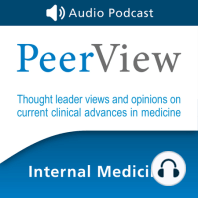68 min listen

Prof. Solange Peters, MD, PhD - Parsing the Practicalities of Pathologic Response Assessment After Neoadjuvant Immunotherapy to Facilitate Progress in…
Prof. Solange Peters, MD, PhD - Parsing the Practicalities of Pathologic Response Assessment After Neoadjuvant Immunotherapy to Facilitate Progress in…
ratings:
Length:
91 minutes
Released:
May 30, 2022
Format:
Podcast episode
Description
Go online to PeerView.com/HCZ860 to view the activity, download slides and practice aids, and complete the post-test to earn credit. The immune checkpoint inhibitors (ICIs) changed the standards of care in the treatment of advanced solid tumors and are now rapidly transitioning into early-stage, curative-intent settings. New regulatory approvals have been recently granted for several ICIs as neoadjuvant and adjuvant treatments for different cancers, and many more studies are under way. This shift is truly needed, as outcomes had plateaued in resectable cancers. To overcome the challenges of conducting ICI clinical trials in early-stage cancers and facilitate more rapid progress, the need for new surrogate measures of efficacy has been widely recognized. Pathologic response assessment of resection specimens after neoadjuvant therapy has emerged as one such new tool, and there is accumulating evidence supporting its relevance and advantages. However, some unanswered questions remain, and there has been a lack of clarity on how to define, score, and interpret pathologic response, although efforts are ongoing to refine and standardize these measurements. This PeerView educational activity, based on a recent live symposium, provides cutting-edge updates on novel surrogate measures of efficacy of immunotherapies in resectable cancers and practical guidance for using these new tools in clinical trials and practice, with an emphasis on pathologic response assessment after neoadjuvant immunotherapy. Upon completion of this activity, participants should be better able to: Discuss the definition of pathologic response and the biologic and historic rationale, clinical evidence, benefits, and limitations of its use as an early surrogate endpoint of response to neoadjuvant immunotherapy in various solid tumors, Implement different scoring systems available for assessing pathologic response, accounting for practical considerations and complexities, including their accuracy, standardization, reproducibility, and other nuances, to guide treatment decisions in the context of a clinical trial or clinical practice across tumor types, Integrate appropriate strategies for interdisciplinary collaboration and coordination among all members of the healthcare team to effectively leverage pathologic response assessment after neoadjuvant immunotherapy as a surrogate marker in clinical trials and to direct clinical decision-making in practice.
Released:
May 30, 2022
Format:
Podcast episode
Titles in the series (100)
David Malebranche, MD, MPH - Parallel Perspectives: A Unique Look at HIV Treatment Decisions From the Provider and the Patient: Go online to PeerView.com/ZWH860 to view the activity, download slides and practice aids, and complete the post-test to earn credit. by PeerView Internal Medicine CME/CNE/CPE Audio Podcast